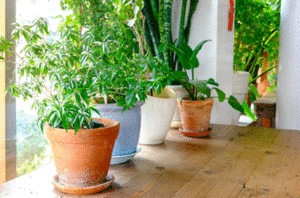 A lot of homeowners expend significant time, money and effort cleaning and purifying their indoor air. Sometimes this obtains mixed results. However, there’s one relatively simple way to help clean indoor air that is consistently effective — houseplants. While all plants take in carbon dioxide and release oxygen, some plant varieties actually pull noxious chemicals from the air, including benzene and formaldehyde. These substances and others can contaminate indoor air as a result of household products and even new furniture and carpeting. Following are some houseplant types that can help clean your indoor air:
A lot of homeowners expend significant time, money and effort cleaning and purifying their indoor air. Sometimes this obtains mixed results. However, there’s one relatively simple way to help clean indoor air that is consistently effective — houseplants. While all plants take in carbon dioxide and release oxygen, some plant varieties actually pull noxious chemicals from the air, including benzene and formaldehyde. These substances and others can contaminate indoor air as a result of household products and even new furniture and carpeting. Following are some houseplant types that can help clean your indoor air:
- The garden mum — According to NASA research on houseplants and air quality, the garden mum removes benzene, xylene, ammonia and formaldehyde from the air, among other chemicals. They’re easily purchased at garden and home improvement stores, and you can plant them after they’re done blooming.
- Aloe vera — Also known as “the medicine plant,” aloe vera is easy to grow and thrives in the sunlight. Among airborne chemicals it targets are benzene and formaldehyde. Gel from the aloe vera plant has other beneficial uses, helping to heal skin cuts and soothe irritations of the skin such as insect bites and sunburn.
- Spider plant — Simple to grow, spider plants are an excellent choice for folks new to gardening and indoor plants. This attractive plant filters formaldehyde, benzene and even carbon monoxide. It also can process xylene that’s contained in paints and varnishes.
- English ivy — This common plant’s specialty is filtering out bacteria such as E Coli and toxins in the air, including formaldehyde.
These are just a few houseplants that do a good job of helping to purify indoor air. Others include Boston ferns, the peace lily, dracaenas, African violets and chrysanthemums.
You don’t want to totally rely on indoor plants to keep your indoor air clean, however. They should play a role in a multi-faceted indoor air quality strategy, which includes effective air filtration, humidity control and eliminating sources of dirty air.
For more advice on how to improving indoor air quality in your Corpus Christi area home, please contact us at CCAC, Inc.
Our goal is to help educate our customers in Corpus Christi, Texas about energy and home comfort issues (specific to HVAC systems). For more information about improving IAQ with houseplants and other HVAC topics, download our free Home Comfort Guide or call us at 361-678-2495.
Credit/Copyright Attribution: “imnoom/Shutterstock”












